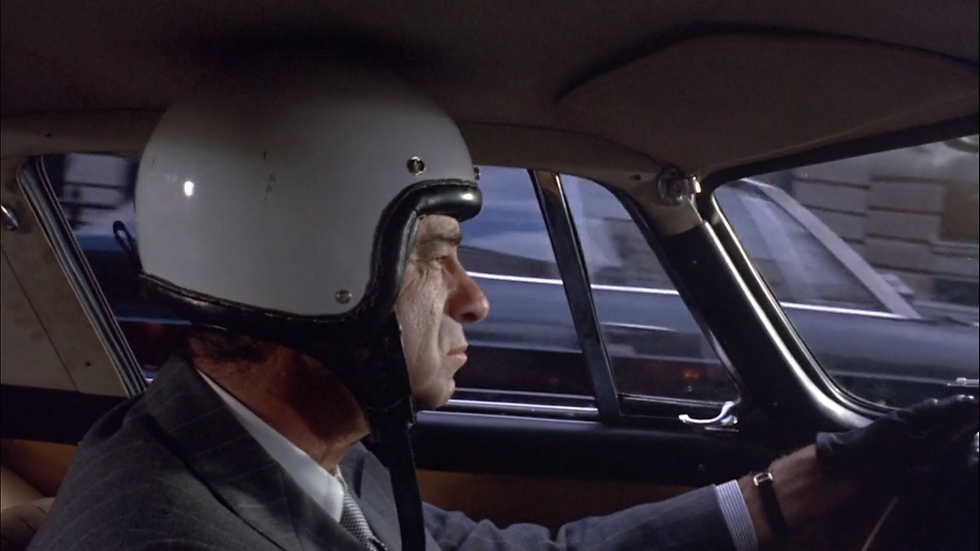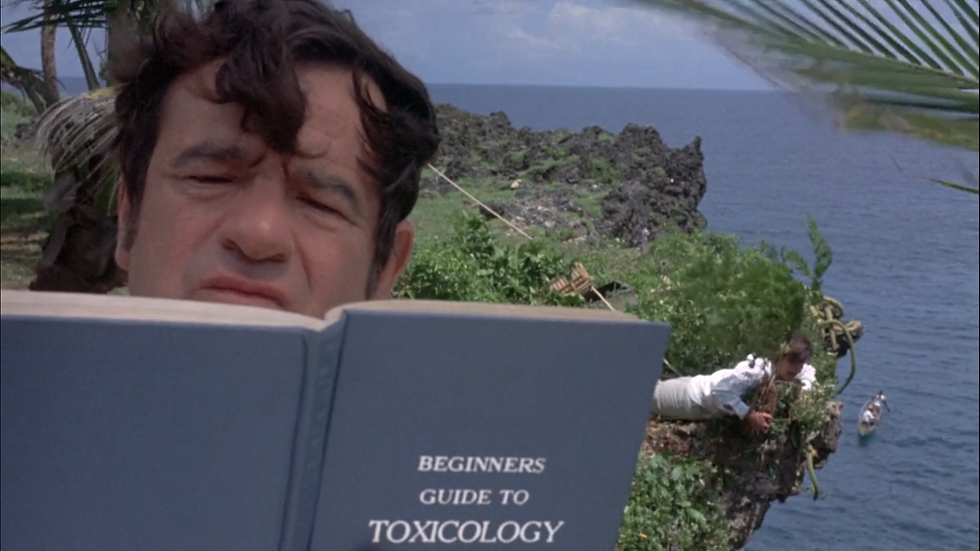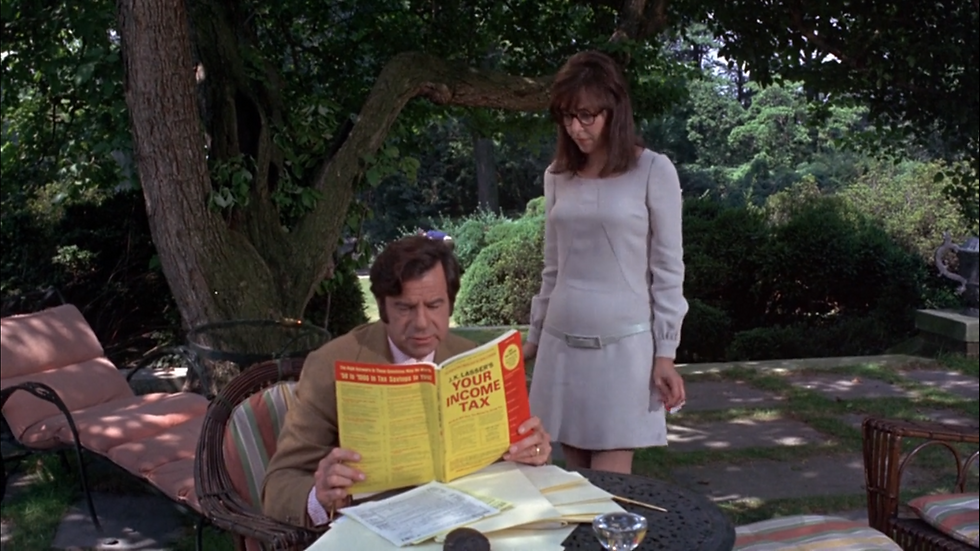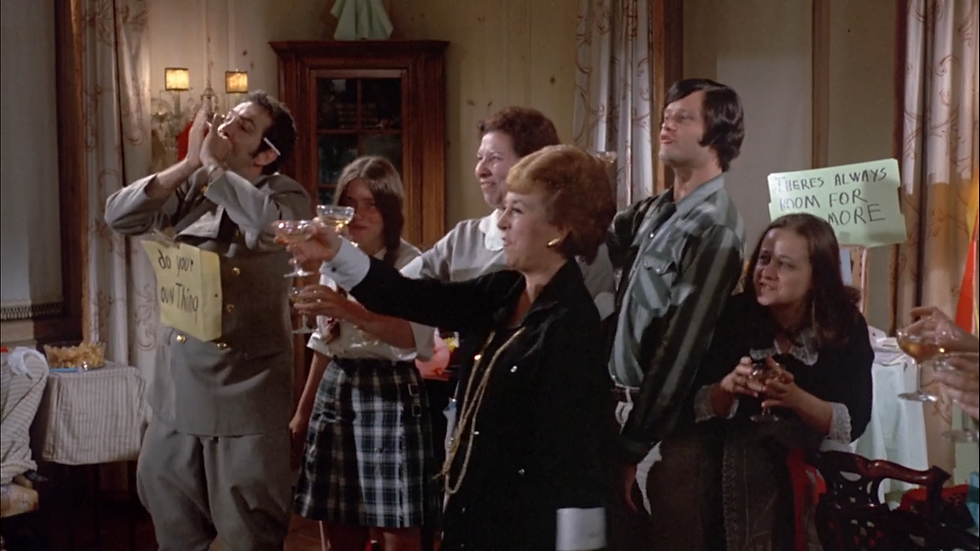A New Leaf (1971)
- adamsoverduereview
- Aug 1, 2025
- 6 min read

It was my wife’s birthday weekend, so I put together a bunch of movies we haven’t seen with genres and vibes she likes and let her pick from them. She likes dark or quirky comedy/romances, so this sounded right up her alley (and she loved it!).
A New Leaf is a 1971 American dark comedy and the directorial debut of Elaine May, who was already a veteran playwright and comedy performer. She also wrote the screenplay, adapted from a Jack Ritchie story. The story follows Henry Graham (Walter Matthau), a privileged man-child living in New York. He spends his days at social clubs and activities while having his constantly breaking down Ferrari towed to the mechanic. It is an impractical car to have in the city and he doesn’t know how to take care of it, but he wastes massive amounts of money fixing it (he also wears a racing helmet when he drives it, looking like a complete jackass).

Decisions like this have bled his inheritance dry. The movie opens with him dodging calls from his lawyer, even hopping out of a small plane while it is taxiing and running away. Henry could have lived comfortably for the rest of his life, but he insisted on selling and leveraging his assets to increase his yearly allowance. Now he has nothing, and no knowledge or skills to earn a living.
Henry’s butler and ”gentleman’s gentleman” Harold (a pitch perfect George Rose) is shocked and dismayed to find out his employer will be destitute. Harold treasures buttling for a true gentleman, and worries about losing that just as much as his paycheck. In one of many great lines in the movie, Harold says to Henry, “You have managed, in your own lifetime Mr. Graham, to keep alive traditions that were dead before you were born.” He suggests there is only one respectable solution for a gentleman in Henry’s position… “Suicide?” asks Henry. Instead Harold suggests marrying a wealthy woman. Henry seems to have no sexual interest in women (later, a woman is about to remove her top and he shouts “No, don’t let them out!”), but his biggest concern is just having to share his things and his life with another person. Having to listen to her talk, having to deal with her always just… being there! It's a nightmare for someone as selfish and spoiled as Henry. So he adds his own secret addendum to the plan. Find a rich woman to marry… then murder her for her money! This deliciously dark premise gets a lot of mileage out of Henry being a complete bastard. To stay afloat, Henry gets a lifeline loan from his uncle (who hates him) with terms that will take everything he owns if he can’t secure repayment in two weeks.

Just when Henry is starting to give up hope, he sees the perfect target in her ill-fitting, crumb covered dress. Henrietta (played by director May) is a rich botanist who also happens to be painfully socially awkward and incredibly clumsy. Henry makes an impression at a ritzy gathering by using his bastard behavior to make a scene and insult the hostess who kicked Henrietta out for spilling her tea too many times. He offers her a ride home in his Ferrari (or at least in his Ferrari being towed by a tow truck). Henry quickly forges (in multiple senses of the word) a bond with Henrietta, reading up on botany and asking about her dreams and ambitions. They decide to marry within a week, and Henrietta’s lawyer Andy (Jack Weston) is enraged. Andy has unromantically proposed to Henrietta multiple times and been rebuffed, leading to one of my favorite exchanges in the film.
“Its just that with your discrete beauty and womanly presence, I find it deeply suspicious for anyone who claims to have penetrated the many mysteries of your personality in just three days…” -Andy
“You're saying that I’m plain and shy, but that after a while you get used to it.” - Henrietta

Despite untimely revelations about Henry’s financial situation, he still convinces Henrietta to marry him. He spends their honeymoon researching how to poison her, she spends it looking for new plant life (her dream being to discover and name a new fern). When they return to Henrietta’s crowded home, Henry realizes he is not the first to take advantage of Henrietta. He disposes of her overflowing staff of scammers and scumbags. For the first time he has to learn some adult tasks and responsibility while also helping Henrietta remove price tags from new dresses and remain relatively crumb-free.

Henrietta dreams of Harold teaching at the university with her and grading papers together in the evenings, while Henry schemes on how to obtain poisonous pesticides that Henrietta refuses to use on her property. Things come to a head when the two take a trip alone in the Adirondacks.
This is a wonderfully wry and witty comedy with a nasty streak that also hides a little bit of heart. Matthau is great in the lead role, a useless man who knows nothing but how to navigate high society and project propriety. As I watched his performance, I imagined this being remade as a modern comedy with Will Ferrell or someone similar in the lead. It's not that crazy an idea, May’s next film The Heartbreak Kid was remade in 2007 by the Farrelly brothers with Ben Stiller starring! I think most comic actors would be tempted to make Henry more over the top in his stupidity, or more belligerent in his general demeanor. Matthau does a much more subtle job, frequently deadpan or offhand with his asshole comments, shooting quiet looks of disgust or disbelief at people. The only overtly goofy thing is the sight gag of his racing helmet. May is delightful as Henrietta, making a character who is inherently a (book)smart and decent person enough of a mess that she could seem excited about being with Henry. The film also does a great job of slowly letting in a little heart and humanity so the ending feels earned. Instead of trying to soften Henry’s character too much, the movie smartly introduces a bunch of other bastards in Henrietta’s life for him to deal with. He is unwittingly doing good and growing as a person even though it is for malicious reasons. That is also an example of how the story changes gears a number of times to keep things moving and provide new conflicts and comedy.

Apparently Elaine May’s longtime issues with Hollywood studios started before her directorial debut was even complete. A New Leaf went over budget and over schedule shooting, and they even tried to replace May during production (but thanks to her contract it would have cost them $200K, so they changed their mind). After ten months of editing May still refused to show a rough cut to the studio, so the infamous Robert Evans took her 180 minute cut and trimmed it to the 102 minute version that was released. Decades later there was interest in releasing the additional scenes, but the footage could not be found in the vaults. This 180 minute version sounds even darker, with an entire subplot about Henry discovering lawyer Andy and another character are blackmailing Henrietta. He poisons them, and this changes the tone of the ending to seem like Henry is accepting life with Henrietta as a punishment/sentence for his crime. I wish there was a director’s cut so I could see all that and spend more time with this script and these characters. It is impossible to judge the version of the movie I didn’t watch, but I loved the shorter, sweeter cut. Usually I am all for pitch-black comedy and twisted or bitter endings, but in this case I was happy that the film’s heart of coal had a few glowing embers at the end to warm the audience. Unfortunately, Evans’ more “audience friendly” cut was still not a hit at the box office (although critics loved it), especially considering the budget issues.
I look forward to watching the rest of Elaine May’s films, which unfortunately is a small body of work. She only directed two more films in the 1970s, The Heartbreak Kid (1972, written by Neil Simon) and Mikey and Nicky (1976, written by May). She spent most of the 1980s doing uncredited re-writes until she wrote and directed the notorious flop Ishtar (1987), which stopped her directing career dead. Women don’t get as many chances as men before they get sent to directors’ jail, unfortunately, and I can imagine for many studio types it was a welcome excuse to stop dealing with a strong-willed and smart woman. Since 2019 there has been talk of her directing another movie starring Dakota Fanning called Crackpot. As of 2024 potential co-star Sebastian Stan said the insurers were still seeking a back-up director to complete production if the now 93 year old May is unable to do so. I hope it gets made. I am also bummed that she pretty much stopped acting after this, because I loved her performance as Henrietta!







Comments